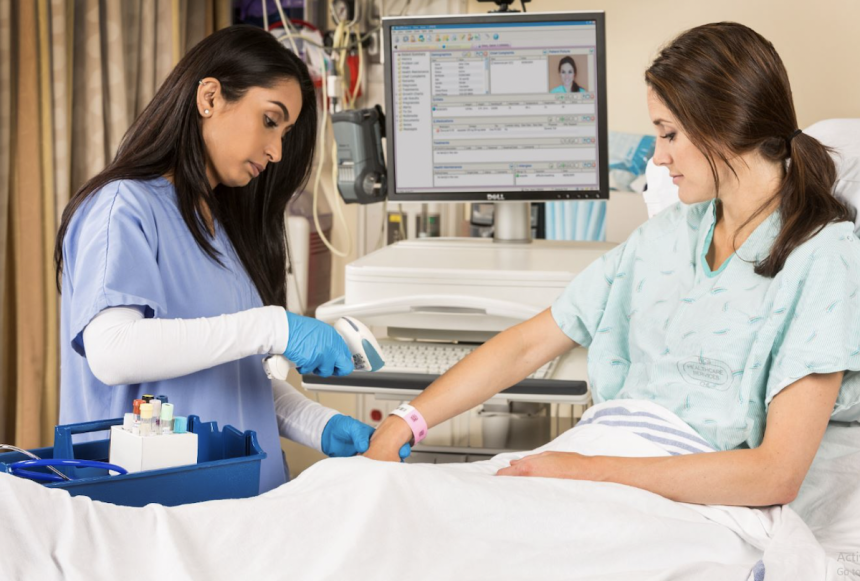Technology plays a crucial role in reshaping hospital operations and improving patient care. One important innovation that’s changing things is the medical barcode scanner. This article looks deeper into the impact of medical barcode scanners on healthcare, highlighting their role in streamlining hospital workflows and ensuring patient safety. We’ll also explore the challenges associated with their implementation and strategies to overcome them.
The Role of Technology in Hospital Operations
Hospitals have much to juggle – from managing resources to meeting regulatory standards. Technology serves as a catalyst, helping hospitals overcome these hurdles and efficiently deliver quality care. Like most industries, hospitals have embraced rapid technological advancements in several ways. One form of technology that works best for hospital staff, including doctors and nurses alike, is the ability to scan a patient’s information digitally through a medical-grade barcode scanner.
Understanding Medical Barcode Scanners
Medical barcode scanners are sophisticated tools designed to decode barcodes affixed to specific items like patient wristbands, medicines, and supplies. These barcodes contain essential information, simplifying tasks such as patient identification, medication management, and inventory control.
For example, a barcode on a patient’s wristband may contain the patient’s name, date of birth, and medical record number. Similarly, barcodes on medication packaging provide vital details about the medication.
Medical barcode scanners can also be integrated into various hospital workflows, helping with tasks beyond patient care, such as checking patients in and out, managing inventory, and tracking medical equipment.
By simply scanning barcodes, hospital staff can access accurate information, streamline their work, and minimize manual errors associated with traditional paper-based systems.
Ensuring Compliance and Regulatory Standards
Hospitals must adhere to stringent regulatory standards set by organizations like the FDA (Food and Drug Administration) and The Joint Commission. They must ensure patients’ safety, maintain a certain quality of care, and uphold ethical standards.
Barcodes allow hospitals to create detailed documentation and establish audit trails, providing verifiable evidence of adherence to regulatory guidelines. Every scan performed by a barcode scanner generates a digital record that captures important details, ensuring transparency and accountability in healthcare operations.
One key way is to document patient care processes. As discussed earlier, barcodes can capture essential information about patient wristbands, medication, and medical supplies. This documentation is essential for demonstrating compliance during audits or regulatory inspections.
Overcoming Implementation Challenges
Implementing barcode scanning technology in healthcare settings can present challenges like cost, staff training, and stakeholder engagement.
To overcome cost constraints, hospitals can develop comprehensive budget plans that outline the initial investment required for barcode scanning technology and identify potential funding sources or cost-saving. Additionally, hospitals can conduct a cost-benefit analysis to assess the long-term value and return on investment associated with barcode scanning technology.
Healthcare professionals, including nurses, physicians, pharmacists, and support staff, must undergo staff training programs that cater to their specific roles. These training sessions can be conducted in person or online, and ongoing education and refreshers should be provided to reinforce familiarity with the technology. Hospitals can also appoint super-users who serve as mentors and provide ongoing support to their colleagues.
For effective implementation, stakeholders are encouraged to engage early in the process and modify management strategies to overcome resistance and foster a culture of innovation.
Future Trends and Innovations
The future of barcode scanning in hospitals looks promising, with new advancements on the horizon that will revolutionize patient care and hospital operations. Two main areas of progress stand out: integrating emerging technologies like RFID and NFC and seamlessly connecting barcode scanning with electronic health records.
RFID and NFC Technology
New technologies like RFID and NFC are improving barcode scanning in healthcare. RFID tracks objects in real-time using radio waves, improving inventory management and patient safety. NFC allows contactless communication between devices, enhancing data transfer and interaction between barcode scanners and mobile devices, making healthcare workflows more flexible and practical.
Integrating Barcode Scanning with Electronic Health Records (EHRs)
Also, connecting barcode scanning with electronic health records (EHRs) improves data sharing and simplifies clinical tasks. This connection removes the need for manual data entry, lowers mistakes, and guarantees precise patient records. It allows healthcare workers to get important patient details straight from barcode scans, leading to better decisions and more efficient care. It also automates documenting clinical activities, ensuring thorough data collection for billing, compliance, and quality reporting.
Barcode Scanning in Telemedicine
Barcode scanning is also expanding its role in telemedicine and remote patient monitoring. As healthcare continues to evolve towards decentralized models, barcode scanners serve as a valuable tool for capturing and transmitting vital health information from remote locations.
Whether checking medications during virtual visits or tracking patients’ treatment progress, barcode scanners help healthcare providers maintain consistent patient care, no matter where they are.
Closing Thoughts
Medical barcode scanners are incredibly useful in hospital settings, helping with vital functions such as accurately identifying patients and adhering to regulatory standards. By embracing barcode scanning technology, hospitals streamline processes and lay the groundwork for a future where healthcare professionals can devote more time and attention to providing top-notch care to patients. This shift towards prioritizing patient care ultimately means better outcomes for everyone involved.
How To Choose Barcode Scanning Products
There are many vendors for medical barcode scanners, including Zebra, Code, and Wasp products. Before choosing a type of barcode scanner for your hospital’s tech stack, be sure to ask plenty of questions and have the vendor provide a demo of the product (preferably on-site). You’ll also want to be sure you choose a vendor that matches your alotted budget for such technology.
Lynn Martelli is an editor at Readability. She received her MFA in Creative Writing from Antioch University and has worked as an editor for over 10 years. Lynn has edited a wide variety of books, including fiction, non-fiction, memoirs, and more. In her free time, Lynn enjoys reading, writing, and spending time with her family and friends.















